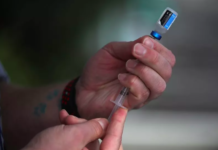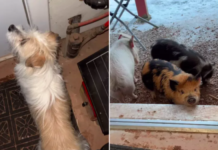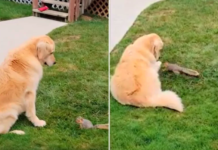Last Updated on March 11, 2024 by Fumipets
Puppy’s Balls Drop
Your young male dog’s testes aren’t in his scrotum at birth, but they should be there soon. He’ll need surgery if they don’t. The age at which his balls drop varies per dog, but it should happen by the time he is two months old.
Testicles
A male puppy’s testicles are close to his inguinal ring when he is born. They should descend into the scrotal pouch by the time he’s a week to ten days old. The testicles must descend outside to become viable since the body of an animal is too heated for sperm production. The temperature in the scrotum, behind the penis, is ideal for sperm. The scrotum is connected to the puppy’s abdominal cavity for the most part.

Cryptorchidism
If one or both of your puppy’s testicles haven’t dropped by the time he’s two months old, he’s probably cryptorchid, which means he has undescended testicles. In certain breeds, particularly tiny dogs, this problem is inherited. The right testicle is twice as likely as the left to not descend, according to PetMD. It’s possible that the retained testicle will remain in the puppy’s inguinal canal. If this is the case, your veterinarian will be able to detect it during an examination. She’ll also use an ultrasound to pinpoint its precise position.

Surgery
The undescended testicle in your dog will need surgery to be removed. Because there’s a possibility the testicle may drop before the dog reaches the age of six months, your vet may decide to do the operation later. She will also neuter your dog by removing the other testicle. Cryptorchidism is a hereditary defect that should not be handed on, even if you want to breed your dog. Standard neuter operations are very simple, however cryptorchid surgeries are a little more difficult. Your veterinarian will create a big incision in the belly to locate and remove the testicle in conventional procedures. This procedure may be done laparoscopically, with just a few tiny incisions needed. If your veterinarian does not do laparoscopic surgery, she may refer you to one who does.

Testicular Tumors
Your dog’s chances of developing testicular tumours are considerably higher if he doesn’t get the operation. Male dogs with non-descended testicles are significantly more likely to develop cancers than dogs with normal testicles, according to Michigan Veterinary Specialists. When cancer is discovered, only around 20% of tumours have metastasized, or spread, thus the prognosis is usually good. The dog, on the other hand, will need abdominal surgery, as well as chemotherapy and radiation.
https://www.youtube.com/watch?v=kOy0sSaj8kw


















